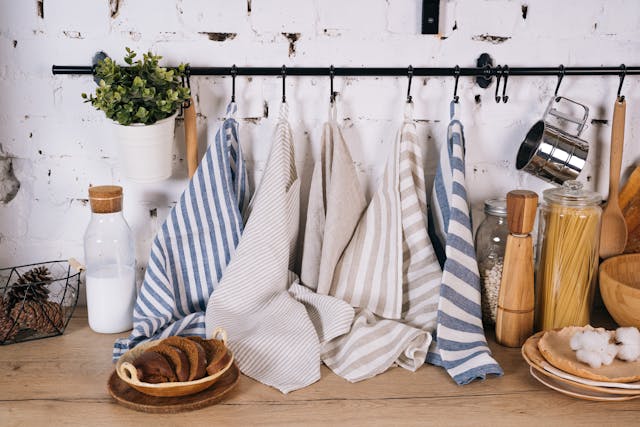
Ditch the Disposables: The Environmental Benefits of Using Reusable Towels in the Kitchen
The average household goes through dozens of rolls of paper towels every year, using them for everything from drying hands to wiping counters and soaking up spills. While paper towels may seem harmless, their production and disposal come at a significant environmental cost. One of the simplest and most impactful ways to create a more sustainable kitchen is to switch to reusable towels.
Here’s why making the change matters—and how it benefits both the planet and your wallet.
1. Reducing Deforestation and Resource Waste
Paper towels are typically made from virgin pulp—meaning trees are cut down specifically to make them. Producing one ton of paper towels requires:
- Around 17 trees
- 20,000 gallons of water
- Large amounts of energy and chemicals
Now multiply that by the billions of rolls used every year worldwide, and it’s easy to see the scale of the problem. Switching to reusable towels made from organic cotton, bamboo, or even old t-shirts dramatically cuts the need for deforestation and resource-intensive manufacturing.
2. Less Waste Sent to Landfills
Most paper towels are single-use and non-recyclable due to contamination with food, grease, or cleaning products. That means nearly all of them end up in landfills, where they:
- Contribute to methane emissions during decomposition
- Create bulk waste that takes years to break down
- Require constant repurchasing and disposal
Reusable towels, on the other hand, can be washed and reused hundreds of times, reducing your household waste output by a significant margin. Even if a reusable towel eventually wears out, it can often be composted (if natural fiber) or repurposed as a rag.
3. Saves Water and Energy Over Time
It might seem counterintuitive, but despite the water and energy used to wash reusable towels, their overall environmental footprint is far lower than the ongoing production and disposal of paper towels.
One set of 10–20 reusable towels can replace hundreds of rolls of paper towels in its lifetime. The impact of washing them—especially when done in full loads and air-dried—is negligible compared to the constant demand for new paper production.
4. Saves Money Long-Term
From an economic standpoint, reusable towels are also a smart move. While a set of high-quality kitchen cloths might cost more up front than a bulk pack of paper towels, that one-time investment quickly pays for itself. Over time, you’ll spend less on paper towel refills and make fewer trips to the store.
Bonus: You can make your own reusable towels for free by repurposing old clothes, towels, or linens.
5. Just as Effective (If Not More)
Reusable kitchen towels can:
- Handle bigger spills without falling apart
- Be more absorbent than thin paper towels
- Tackle greasy messes with less tearing or waste
- Dry dishes, hands, or surfaces more efficiently
With different towel types (e.g., microfiber for streak-free cleaning, cotton for drying), you can build a small but versatile collection that meets all your kitchen needs—no paper required.
Keep Them Clean: Hygiene Tips
To ensure your reusable towels stay safe and sanitary:
- Designate specific cloths for different uses (e.g., hand-drying vs. cleaning).
- Hang to dry between uses to prevent bacterial growth.
- Wash them frequently in hot water with detergent.
- Avoid using fabric softener, which can reduce absorbency.
With proper care, reusable towels are just as hygienic as disposables—without the waste.
A Small Change with a Big Impact
Switching to reusable kitchen towels might feel like a small adjustment, but when done consistently, it’s a habit that leads to:
- Fewer trees cut down
- Less waste in landfills
- Reduced energy and water use in manufacturing
- Cost savings for you and your family
In a world facing serious environmental challenges, everyday decisions like what we use to clean up a spill truly matter. Choosing reusable over disposable is a simple but powerful way to clean up your kitchen—and the planet.